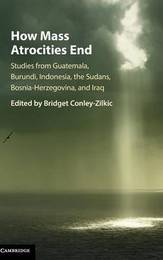
|
How Mass Atrocities End: Studies from Guatemala, Burundi, Indonesia, the Sudans, Bosnia-Herzegovina, and Iraq
Hardback
Main Details
| Title |
How Mass Atrocities End: Studies from Guatemala, Burundi, Indonesia, the Sudans, Bosnia-Herzegovina, and Iraq
|
| Authors and Contributors |
Edited by Bridget Conley-Zilkic
|
| Physical Properties |
| Format:Hardback | | Pages:244 | | Dimensions(mm): Height 229,Width 152 |
|
| ISBN/Barcode |
9781107124370
|
| Classifications | Dewey:341.67 |
|---|
| Audience | | Professional & Vocational | |
|---|
| Illustrations |
6 Tables, black and white; 5 Halftones, unspecified; 5 Halftones, black and white; 1 Line drawings, black and white
|
|
Publishing Details |
| Publisher |
Cambridge University Press
|
| Imprint |
Cambridge University Press
|
| Publication Date |
1 April 2016 |
| Publication Country |
United Kingdom
|
Description
Given the brutality of mass atrocities, it is no wonder that one question dominates research and policy: what can we, who are not at risk, do to prevent such violence and hasten endings? But this question skips a more fundamental question for understanding the trajectory of violence: how do mass atrocities actually end? This volume presents an analysis of the processes, decisions, and factors that help bring about the end of mass atrocities. It includes qualitatively rich case studies from Burundi, Guatemala, Indonesia, Sudan, Bosnia, and Iraq, drawing patterns from wide-ranging data. As such, it offers a much needed correction to the popular 'salvation narrative' framing mass atrocity in terms of good and evil. The nuanced, multidisciplinary approach followed here represents not only an essential tool for scholars, but an important step forward in improving civilian protection.
Author Biography
Bridget Conley-Zilkic is Research Director of World Peace Foundation, where she currently leads research on the How Mass Atrocities End project. She is also an Assistant Research Professor at The Fletcher School, Tufts University, Massachusetts. Professor Conley-Zilkic has published multiple essays on mass atrocity prevention and response, and on the potential for museums to engage human rights issues. She received a Ph.D. in Comparative Literature from State University of New York, Binghamton in 2001.
Reviews'How Mass Atrocities End ... proves itself a critically important book, one that goes beyond trite good/evil dualisms in order to present a realistic assessment of the political, economic, and military factors (among others) that contribute to a secession of large-scale violence. This is not a book for idealists, but it is a book for those who would stand a chance as seeing their ideals for peace actually implemented.' Guy Lancaster, International Journal on World Peace
|